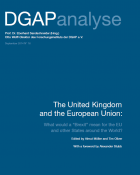This compilation examines what a British Exit – a “Brexit” – from the EU could mean for the rest of the Union, its individual members, wider Europe, and other states around the world such as the United States and Japan.
This publication gathers 26 views from research institutions and universities from sixteen EU member states, nine non-EU countries, and a view from the EU’s institutions in Brussels. It brings together a range of national viewpoints on the direction of the UK’s relations with the EU. The contributions also give an insight into how the current EU debate in Britain is perceived in other countries.
The UK’s options appear quite limited at this point in time. While the European Parliament elections in May 2014 registered dissatisfaction with the EU in countries other than Britain, according to the views gathered in this volume, other EU governments are not likely to align with London; many of them perceive the British long-term EU agenda as opaque or unpredictable. While some of the UK’s criticisms of the EU and proposals for its reform are seen as legitimate, it is not seen as legitimate to advance this agenda out of a purely national interest and using the threat of leaving as leverage; this is how many in the rest of the EU interpret UK maneuvering. London will have to work harder and engage in more effective coalition-building if it wants to succeed in shaping to its own preferences the ongoing debates about EU reform.
The British government’s own behavior of focusing on Germany while neglecting, and in some areas abusing, relations with former close partners in central and eastern Europe and Scandinavia means that Britain has found itself on the sidelines of EU politics. Both the UK and the rest of the EU need to appreciate that this position could easily turn into the outside, either by Britain leaving, or by the EU leaving the UK behind by integrating in ways that exclude it. Regardless of whether Britain will ever leave the EU, this compilation shows that the way in which Britain’s current EU debate is being perceived also shapes how the country’s place in the EU will be seen in the years to come.
Edited by Almut Möller and Tim Oliver, with a foreword by Alexander Stubb, Prime Minister of Finland.
